#even though i like platonic ma/iko
Text
So I saw a post earlier...
(I’m gonna paraphrase because I don’t want to tag OP or argue), that basically went like, “If M/ai is toxic and unsupportive as a partner, why do y’all (read: zutara fans) think shipping her with Ty Lee could work?”
Where do I start?
First of all, I’m a Zutara shipper and a Mai stan (mostly in a fanon sense because a lot of her characterization unfortunately got shunted by Bryke into revolving around Zuko.) But even in canon, I love the potential that this badass, goth knife girl had. And I can empathize with the extent that her childhood trauma caused her to repress her emotions.
As SO many Zutara fans have said already, it’s the relationship (not the characters themselves) that's unhealthy. As in, it isn’t beneficial for either M/ai or Zuko. I love BOTH characters, but I don’t think it’s what either of them needed in terms of partners for several reasons; Most significantly because of their struggles with emoting and communicating. Also, the phrasing of that original post neglects to take into account that people act differently with different people. You can be toxic in one person’s life and not in another’s (again, not implying that M/ai is toxic.)
I don’t want to spend this whole meta talking about Ma/iko because I want to talk about my fav sapphics, but I do want to contrast the first scenes where we see them interact (in terms of M/ai’s response.)
Starting with The Awakening, M/ai and Zuko are a newly established couple (after three years apart and without any on-screen acknowledgment of what has changed.) This scene has been analyzed to death over the past few days so I won’t get into it.
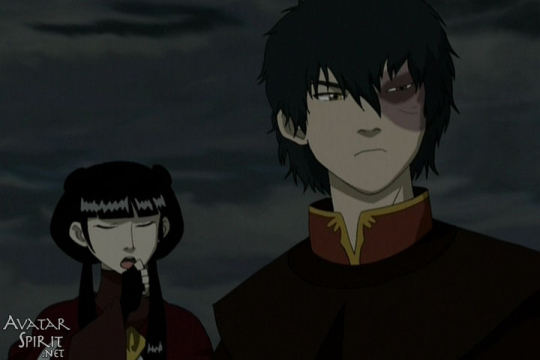
But this is the first time Ty Lee and M/ai are reunited:
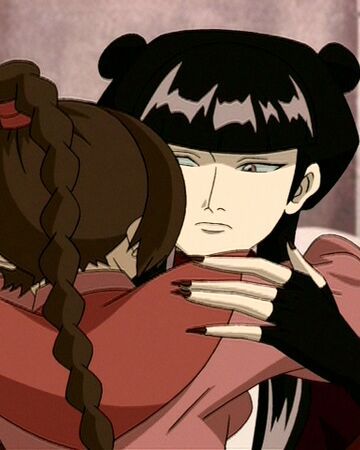
M/ai, who usually has a stoic expression, almost looks sad in this scene. And then she says this:
I thought you ran off and joined the circus? You said it was your calling.
One could infer many things from that line. That M/ai and Ty Lee talked about their future plans at some point in the past. That it was important enough for M/ai to remember. And that M/ai’s conflicted expression means she realizes that seeing Ty Lee again meant she had to leave a place that was special to her (the circus.) Then Ty Lee responds:
Well Azula called a little louder!
Even though she says it in a cheerful voice, it’s almost an unspoken understanding between them that she didn’t have a choice. I think this is part of the reason M/ai agrees to join, so that Ty Lee doesn’t have to be alone.
Also, M/ai is pretty perceptive towards Ty Lee, which makes sense because they are canonically close. In The Chase episode, Ty Lee is trying to find the word to describe Appa’s fur. Azula walks off and ignores her, but M/ai was listening and gave her the word she was looking for. Ty Lee gets SO happy that she jump-hugs M/ai, and M/ai’s face goes soft. It’s a small moment, but we know that Ty Lee struggles with getting attention since she grew up with identical sisters. Having someone like M/ai as a partner, someone who listens, complements her well.
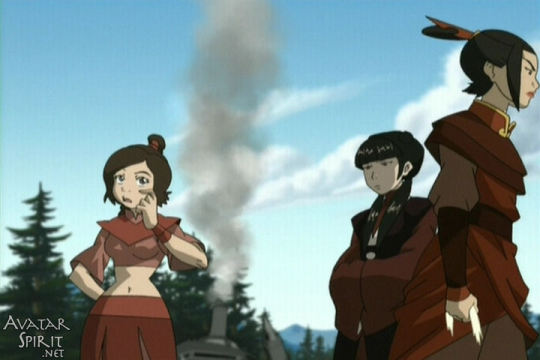
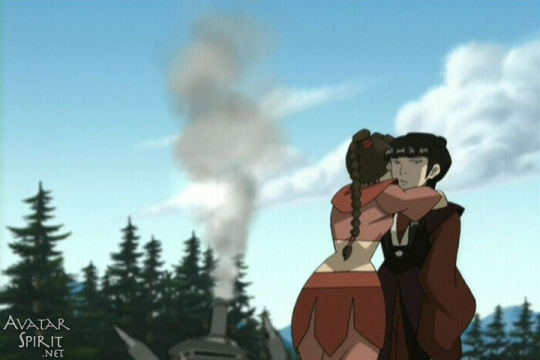
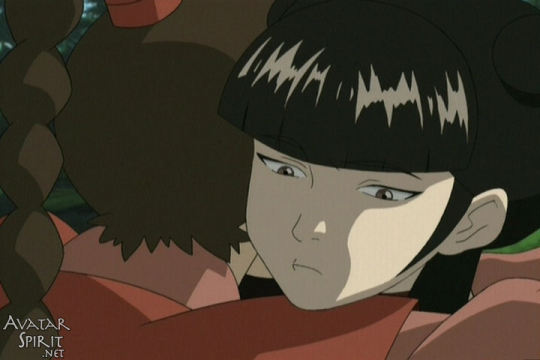
And don’t even get me started on THIS scene. The emotion on M/ai’s face is truly powerful. M/ai being put first by someone; this girl who values loyalty and yet, was not expecting it. And then, both of them being fully prepared to die in each other’s arms. Arguably one of the most meaningful moments for M/ai.

And finally, MaiLee already have really strong communication and emotional vulnerability. In the Smoke and Shadows comic, Ty Lee opens up about her fears now that Azula is out of prison (something she could’ve told Suki or any of the other Kyoshi warriors instead), and M/ai finishes her sentence because that same feeling resonates in her as well. Because of their shared experience. It’s a moment of vulnerability for them both.
M/ai breaks up with Zuko (in the comics) because she felt he closed off any emotional conversations about his worries. In my opinion, this isn’t something that would exist within MaiLee dynamic. And perhaps Ty Lee’s emotional openness could encourage M/ai to become more comfortable with expressing her own emotions and finding things she likes (rather than hates) about the world.
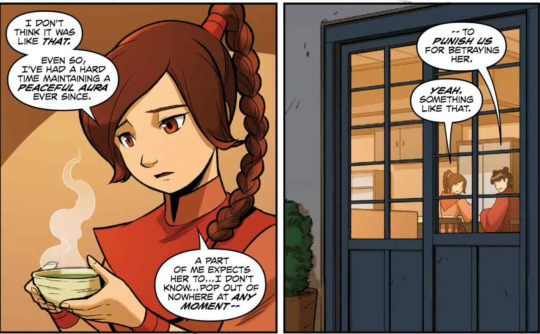
#this started with a purpose and then i got derailed because i'm in mailee brainrot#mailee#anti maiko#even though i like platonic ma/iko#i just think there's a difference in how m/ai responds to them#i do think she cared about zuko and tried to be there like waiting outside the war room#but she looked distressed when she realized she couldn't comfort him#i just think ty lee and m/ai would balance each other's flaws more#and they know each other pretty well#and i think ty lee would encourage m/ai to talk about her bottled up feelings whenever she was ready#also i just like the sunshine goth pairing
190 notes
·
View notes
Note
Does anybody else just forget that Zutara isn’t canon sometimes
Okay, so you know how I keep mentioning that I’m not really a shipper, and it’s true. I DON’T feel the need to ship characters, and most things that I do are platonic. I have always hated the notion that friendships are an inferior form of human connection to romantic relationships because it’s just not true. There’s something so pure and constant about friendships / non-romantic relationships. People simply choosing to exist in your life and be there for you??? WOW.
Which is also why I find it curious that even though romantic subplots are constantly shoved down our throats in pretty much every single genre of storytelling, people seem unable to actually write good ones. Honestly, most romances in media either seem forced (cuz, of course, you NEED to have a romantic partner, god forbid people remain single) or some level of unhealthy/toxic because ✨drama✨.
People seem to be under the impression that if Character A and Character B smooch, we’ll be fooled into believing that makes them a good couple. This is kinda just what happens with Kata/ang. This ship is a combination of being extremely forced AND unhealthy with the added bonus of actually ruining the arcs of both characters involved. I’ll keep saying it, I think the point of the Kata/ang setup was actually to NOT have it happen, which really would have tied things up well.
On another note, something I’ve never mentioned, I was always hesitant about the way they wrote Katara. Not another female character pushed into maturity because of circumstances, while the boys around her get to be kids. I hate the Mom friend trope when it applies to young kids. I was actually willing to make peace with it had Zutara ended up happening because Zuko was the only guy who treated her as an equal and she didn’t just end up mommying. (I actually genuinely keep forgetting how old the characters were. Straight up, I still think Zuko, Katara, Sokka, and Suki were in their 20s in Book 3.)
Anyway, Ma/iko also serves a purpose to the story. It was literally introduced exactly because it was an unhealthy relationship. Having them be endgame 100% undermines Zuko’s Book 3 character arc. Sensing a pattern here?
If you take out the final Kata/ang and Ma/iko kisses, literally nothing changes, except you now have a much more solid and consistent story. Heck, if you take out all the stupid Kata/ang blushes from the series too, absolutely fuckall changes.
Finally coming to Zutara. You literally cannot take out anything that reads as romantic subtext without compromising the entire plot and both of their character arcs. They consistently have major pivotal moments with each other and are there for each other in a way that nobody else in their lives seems to be. Even if you want to insist that there was no romantic intent there, FINE. It literally detracts nothing from their relationship. I’m not saying they need to be a couple for it to be meaningful. But this is why I ship them and think it fucking makes sense!!
Even if you don’t want to read into the sun/moon dichotomy, the Oma and Shu symbolism, or their sacrifices (the lightning scene particularly, since people love insisting that Katara just HAPPENED to be there...like Zuko didn’t specifically ask her to be there and Katara didn’t jump at the opportunity and like that doesn’t mean something) as romantic. Even if you take that out of the picture, you literally STILL can’t detangle their arcs and growth moments from each other. The show and both characters would literally change if you took out all the moments that shippers mark as romantic. The show also goes out of its way to set them up as the only people who GET each other. It goes out of its way to show us that no one else has Zuko and Katara’s backs like they do. It goes out of its way to frame all their moments as intimate. in. every. sense. of. the. word.
All of this is to say - I literally don’t give a flying FUCK that some characters kissed and so now I need to accept that. If that’s what it takes to convince an audience that this is the relationship that was meant to be, it’s just not good or well written. I simply refuse that ‘because the showrunners said so’ and ‘they did a kissy’ is all that makes a ship canon. We all know why these things happened. The best part is, most Zutara fans I’ve seen don’t even wish that there had been a kiss between Zuko and Katara in the series finale. That’s how you know you’ve written a good relationship. The kiss should simply reaffirm everything else you have set up along the way, it should not be a goddamn justification for a relationship’s existence.
In conclusion: Zutara IS canon, thank you for coming to my Ted Talk.
#whoops here's another super long answer that nobody asked for#ask#finalgirlsnape#Zutara#anti kataang#anti maiko#anti bryke#atla meta#zutara meta#???#whatever#atla salt
305 notes
·
View notes
Text
On an Immensely Popular Post

Disclaimer: What I’m writing here may not be completely accurate -- like most works of art, literature, and even STEM tend to be -- and as a new fan of ATLA, a few of the metas I publish may be obsolete or unintentionally insensitive. That being said, I like to believe that I can contribute something valuable to this fandom. In all my (real) metas, I wish to be as objective as possible and not rely on my biases, fanon, or common “knowledge” that may just be misconceptions. If anyone reading this finds something to be false or contrived, I am always welcome to constructive criticism. What I am not welcome to is senseless hate or bashing.
My first experiences with the ATLA fandom begun a long, long time ago, but the most recent and powerful revival of my love for ATLA started with me actually watching the show and soon after, with me falling into the endless abyss of ATLA metas on Tumblr. Sifting through the well-written analyses and the emotion-based rants had taught me a lot about critical thinking and the power of influence, so now I’d like to present a meta that critiques an extremely popular post with over 60,000 notes. And since it’s so popular, this is the part where I must make yet another disclaimer.
Disclaimer: I hold nothing against lesbians4sokka (whose name has now been changed to comradekatara). They have the right to share what they want, but since this particular post has become so influential that it’s still being reblogged regularly to this day, I believe it is within my right to criticize it - emphasis on “criticize,” which is different from “hate.”
Now that that’s out of the way, let us begin:
Lesbians4sokka/comradekatara covers 3 main subjects in their post, which I will quote/summarize below:
(1) Ma/iko: “...the entire foundation of mai and zuko’s relationship was built on how miserable they were together, and how they would just sit there and hate the world together— letting their misery fester as they enabled each other’s depression— and I think that’s really unfortunate because they would work so well as friends if they weren’t trying to make their dumpster fire of a relationship work.”
(2) Zutara: “similarly, what makes zuko and katara’s dynamic so compelling is that they share the same flaws, only as opposed to mai’s apathy and misery, it’s katara’s rage and guilt that zuko identifies with. they both share trauma over having lost their mothers, and both in a similar way (sacrificing themselves for them) and they both cope with their grief through rage, often misplaced… katara and zuko have a deep & profound friendship, but if they were to be in a relationship, they would only bring out the absolute worst in each other thru enabling each other’s rage and emotion-driven decision making.”
(3) Z/uk/ka: this pairing makes for a healthy and wholesome relationship because throughout the boiling rock, we see that “sokka and zuko make an excellent team, as they balance each other perfectly. sokka thinks big picture, and plans ahead, but zuko will charge into situations.” They inspire each other, they trust each other unconditionally, they become more open and supportive of each other, they share a lot of common interests and narrative parallels, and in general, just make each other happy (which could work both platonically and romantically).
As for my response: I’m sure many of you are expecting me to start to save the “best for last.” That assumption would be incorrect because I actually have the least to say about point 3.
I agree that Z/uk/ka can be a good relationship. Their dynamic is funny, playful, supportive, etc. etc. (there are so many positive adjectives I could use to describe their dynamic, the list could go on forever). And they could make a great couple.
…
What, did you expect more from me? That’s it, I’m done.
I’m not here to attack Z/uk/ka as a ship, because while I can never actively ship it (I’m a sad, narrow-minded exclusive shipper, always had been and always will be) I can objectively appreciate them as one. It’s points 1 and 2 I’m more concerned about.
Now, since we’ve already begun working backward, I’ll begin my critiques on point 2: I could write extensively about the parallels between Zuko and Katara, including but not limited to shared pain and a few shared flaws - and just a few, because their weaknesses diverge in many important places. However, since I’m trying to write as objectively as possible and since Zuko-Katara parallels have already been discussed to death, my analysis will focus elsewhere.
However, something from comradekatara’s post that I would first like to address is this-
[Zuko and Katara] both cope with their grief through rage, often misplaced. in the southern raiders, they both act deeply insensitively towards sokka by acting as if his grief over his mother’s death is somehow less valid simply because he is a lot quieter in his coping mechanisms and doesn’t project his rage & guilt onto everyone else.
- or rather, the idea that Zuko and Katara’s shared pain causes them to act insensitively towards Sokka (and though the post does not mention it, Aang as well).
(Note: these points have already been covered by countless metas before mine, so you can skip/skim this section to read a newer argument in the next section.)
Even ignoring the fact that the Southern Raiders had many out of character moments, Katara’s insensitivity towards Sokka is first and foremost a reaction against his insensitivity towards her.
_____
Dialogue from Season 3, Episode 16 “The Southern Raiders”:
Aang: Um ... and what exactly do you think this will accomplish?
Katara: [Shakes her head in dismay.] Ugh, I knew you wouldn't understand. [Begins to walk away.]
Aang: Wait! Stop! I do understand. You're feeling unbelievable pain and rage. How do you think I felt about the sandbenders when they stole Appa? How do you think I felt about the Fire Nation when I found out what happened to my people?
Zuko: She needs this, Aang. This is about getting closure and justice.
Aang: I don't think so. I think it's about getting revenge.
Katara: [Angrily.] Fine, maybe it is! Maybe that's what I need! Maybe that's what he deserves!
Aang: Katara, you sound like Jet.
Katara: It's not the same! Jet attacked the innocent. This man, he's a monster.
Sokka: Katara, she was my mother, too, but I think Aang might be right.
Katara: Then you didn't love her the way I did!
Sokka: [Hurt] Katara!
_____
While I believe that Aang’s principles of forgiveness are morally sound, the way he pushes his beliefs onto Katara undermines much of her grief. At first, Aang tries to relate to Katara’s experiences by comparing them to his own, but there is a forceful connotation to his dialogue that suggests that Aang considers himself to be the moral authority compared to Katara. Hence, Aang judges Katara (“I think it’s about getting revenge”) without trying to reach out and understand her, forgoing the empathetic common ground in favor of taking on the moral high ground.
Thus, when Sokka tells Katara, “she was my mother, too, but I think Aang might be right,” Sokka is not only saying that Katara should choose forgiveness, he is implying that Aang is the ultimate moral authority on this matter and that Katara should accept that. Moreover, similarly to Aang, Sokka’s opening line, “she was my mother, too,” had the potential to establish common ground between himself and Katara, but the added “but…” places Sokka on the moral high ground against her instead. Of course, when we remember that just two lines ago Aang equates Katara to Jet, Sokka agreeing with Aang seems even more thoughtless and unsympathetic.
So when Katara lashes out against Sokka, ostensibly “acting as if his grief over his mother’s death is somehow less valid simply because he is a lot quieter in his coping mechanisms and doesn’t project his rage & guilt onto everyone else,” it is important to note that Sokka undermines Katara’s louder, more visible way of grieving as well (though that discounts that for most of the show, Katara only uses her grief over her mother’s death to sympathize with others).
Moreover, Katara’s line, “then you didn't love her the way I did!” is hurtful, yes, but it is not necessarily equivalent to “you didn’t love her as much as I did.” Katara’s love for her mother is different from Sokka’s because her pain over her death is different -- after Kya’s passing, Katara had to carry the emotional burden of becoming a pseudo-mother to Sokka (see Sokka and Toph’s conversation in “The Runaway”), a burden that did not cease after she joined the GAang (see the entirety of “The Desert”). To Katara, Kya was not only her mother, but the representation of the childhood she lost and the sacrifice made to protect her life. Sokka simply does not have that same relationship with Kya.
I do not mean to say that Sokka and Aang unfairly taking on the moral authority in this situation means that this authority instead belongs to Katara (and Zuko) - “The Southern Raiders” is filled with questionable moments from all parties involved. However, TSR is an episode that delves into Katara (and Zuko)’s relationship with a mother’s sacrifice, so how Zuko and Katara respond to this specific trauma from their past does not dictate how they respond to painful circumstances in the present/future. Let’s see how this is true.
Sozin’s Comet, Part 1: The Phoenix King
No doubt Zuko and Katara felt some form of frustration upon Aang’s disappearance, so let’s see how they “[enabled] each other’s rage and emotion-driven decision making”:

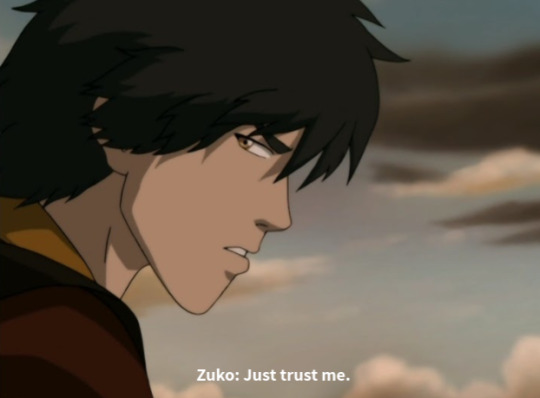
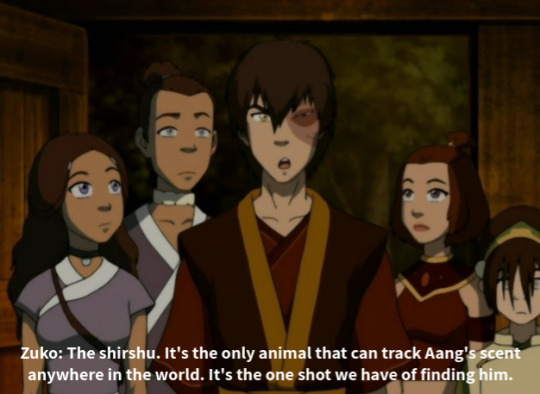
Here, Katara and Zuko make a decision together that turns out to be calm, rational, and not at all emotionally-driven despite their mutual frustration and worry towards Aang.
Sozin’s Comet, Part 2: The Old Masters

Zuko holds immense pain and self-loathing over betraying Iroh, yet Zuko and Katara’s conversation does not enable/exacerbate negativity from any party involved (since Zuko often translates his grief into anger, and Katara was evidently angry at Zuko’s betrayal). Instead, their conversation is open, encouraging, and constructive.
(Note: this is where the review of points made by previous metas ends.)
Hence, to say that “[Zuko and Katara] would only bring out the absolute worst in each other [through] enabling each other’s rage and emotion-driven decision making” - when we are given in-canon examples of the opposite being true - would be a sweeping and inaccurate generalization.
But for the sake of argument let’s say that, hypothetically, Zuko and Katara’s relationship would fail because they only bring out the worst in each other. And here’s where the argument falls apart for me - Is the argument here that Zuko and Katara have an incredibly meaningful friendship yet somehow this “friendship” causes them to enable each other, thus encouraging each other’s worst flaws and regressing each other’s growth? Is a healthy friendship - much less a “deep and profound” one - not one where two individuals can learn from each other in positive ways and balance each other’s shortcomings?
Or is it something different we’re saying here? Are we saying that two individuals can have a “deep and profound” friendship and yet the moment their relationship shifts from platonic to romantic, they are terrible for each other?
While many significant platonic bonds are stunted when they become romantic, I still believe it to be common sense that some of the best romantic relationships stem from a platonic foundation. But since much of “common sense” on the internet sees that “sense” is nonsensical and “common” is a nicer way to refer to mob mentality, I have done my research to show how Zuko and Katara could have been an excellent case of a friends-to-lovers relationship.
An excerpt from my meta, “Research Shows that Zutara Would Have Been the Ideal Friends to Lovers Dynamic.” (give it a read if you want to see references to relationship-research and an overanalysis on diction/tone)
The reason why Zutara is framed as a “toxic and unhealthy” relationship is that their romance would be a classic example of the enemies-to-lovers trope, a trope which modern media has not been particularly kind to. However, when executed correctly, enemies-to-lovers can produce a healthy and loving relationship, frequently relying on friendship as an intermediate between the “enemy” and “lover” stages in the most well-executed versions of this trope. Meanwhile, the trope of friends-to-lovers is just as popular as enemies-to-lovers, though the specific dynamic required between two individuals to achieve this transition is not well-known. Recognizing this, Laura K. Guerrero and Paul A. Mongeau, both of whom are involved in relationship-related research as professors at Arizona State University, wrote a research paper on how friendships may transition into romantic relationships…
According to Guerrero and Mongeau, “...scholars have argued that intimacy is located in different types of interactions, ranging from sexual activity and physical contact to warm, cozy interactions that can occur between friends, family members, and lovers…” Guerrero and Mongeau then reference a relationship model where the initial stages (i.e. perceiving similarities, achieving rapport, and inducing self-disclosure) reflect platonic/romantic intimacy through communication while the latter stages (i.e. role-taking, achieving interpersonal role fit, and achieving dyadic crystallization) often see both individuals as achieving a higher level of intimacy that involves more self-awareness.
In the rest of my research-based meta I demonstrate how Zuko and Katara’s platonic interactions in the show fit into the stages of communicative intimacy (i.e. perceiving similarities, achieving rapport, and inducing self-disclosure) that Guerrero and Mongeau describe as being mutual between friendships and romances. As such, crossing the line between friends and more-than-friends most likely would not cause a dramatic shift in the Zutara dynamic since much of Zuko and Katara’s platonic intimacy easily translates into romantic intimacy. I’ll end off with another excerpt from my meta.
Excerpt from “Research Shows that Zutara Would Have Been the Ideal Friends to Lovers Dynamic.”
“...it would be remiss to simply dismiss the Zutara dynamic as one that would instantly become toxic should they pursue a romantic relationship.”
With that little thought in mind, let’s move onto point 3: an exploration of friendship, romance, and why toxicity is not exclusive to the latter.
Let’s start with what I agree with:
“The entire foundation of mai and zuko’s relationship was built on how miserable they were together, and how they would just sit there and hate the world together— letting their misery fester as they enabled each other’s depression...”
I’m not sure how necessary it is for me to elaborate on this point given that it’s already been accepted by comradekatara and perhaps 60,000+ other users on Tumblr (a gross exaggeration but this remains unimportant), but in her essay, “Zuko, Mai, and the Nature of True Intimacy,” Araeph contributes more nuance to the concept of Ma/iko and mutual misery, stating that,
Unfortunately for [Zuko and Mai’s] relationship, Mai is and will always be a pessimist—a character trait, not a character flaw, in her. The key difference lies in how Mai and Zuko use their negative feelings. When Zuko sinks into negativity, he gives up on any actions that will materially change his world for the better; Mai, on the other hand, can remain negative even at the height of her character development, and it does not impede her ability to act.
So while Mai enables Zuko’s depression, Zuko does not necessarily do the same for Mai. Nonetheless, throughout their relationship for the first half of season 3, neither of them communicate constructively or push each other to grow as people.
This may be the third disclaimer I’m making, but I first want to say I have nothing against Mai. However, I do have something against the idea that “[Mai and Zuko] would work so well as friends if they weren’t trying to make their dumpster fire of a relationship work.”
Their relationship is a dumpster fire, yes, but will the flames cease simply if the amount of intimacy in the relationship changes?
comradekatara state themselves that their entire romantic relationship is quite depressing - they are only able to connect through empty physical intimacy and mutual hatred of the world. Without that, there is little left for them to bond over. Once Zuko overcomes his conflicting morality and inaction from the first half of season 3, he becomes someone who is strongly guided by his principles and beliefs. However, for the entirety of the series, Mai is characterized by her moral apathy. To cite from Araeph again,
It is moral intimacy that is the last and worst omission for Mai and Zuko… Zuko’s struggle to find and follow his principles is the most central aspect of his character, yet it is a struggle Mai neither understands nor respects…
Lack of moral intimacy (not sharing the same core beliefs) is something that applies to both platonic and romantic bonds. Thus, just as transitioning from a meaningful friendship to a romance does not inherently create toxicity in a relationship, switching from a romance that exacerbates one (or both, depending on how you interpret it) party’s misery does not necessarily erase the preexisting negativity in a relationship - perhaps some of it may subside, sure, but as long both parties continue to fail at communicating and understanding each other, even their friendship seems bleak at best. In this case, Mai and Zuko may work well as conditional friends, or in other words, friends who are only friends when they have something to mutually be miserable over. And this tiptoes the line of speculation, but they could be a formidable political team. But unless the Ma/iko dynamic shifts drastically in the lovers-to-friends transition, I’m not sure if there’s much potential in a friendship between them.
In conclusion, there is a lot I don’t agree with from comradekatara’s post, but if there’s one takeaway I want to impart onto everyone who’s read this far, it’s this: crossing and uncrossing the line between platonic and romantic bonds is not always a transformative experience for the relationship, and the nature of human relationships is a complex spectrum -- not a light switch that can only be set between healthy and unhealthy.
Thank you all for reading!
#atla#atla meta#my bated breath analyzes#this is more pro-zukka than anti-zukka#but I will include neither in my tags#zutara#anti maiko#once again this is a critique#not a post meant to tear anyone or their views down#my bated breath's posts
416 notes
·
View notes